What a wonderful day to celebrate in our nation’s history. Today marks not only the day that our government passed what is often referred to as the most important piece of legislation, but it is also what most contribute to the founding of our Nations Middle Class.
Before we get to the GI Bill and its 70th anniversary, I want to start by introducing myself, my name is Michael Joseph Little, and I am the new Legislation and Veterans Services Assistant here at the Association of the United States Navy. I have been a proud sailor for the last 13 years, and currently hold the rank of ABH2 (AW/SW) in the Navy Reserves. While serving on active duty I was stationed onboard the USS Ronald Reagan and USS Tarawa, and since joining the reserves I have deployed to Iraq, Afghanistan and GITMO as part of an Individual Augmentee with the US Army. I hail from a small town in Illinois called McLeansboro, we are known for 2 things, the first is that we are the home of Jerry Sloan, the former NBA Coach of the Utah Jazz, and second is that we are the home of 29th Governor of the State of Illinois, 28th National Commander of the American Legion, “Father” of the GI Bill, and a honorable member on my family tree.
I was honored to represent AUSN earlier this week with my wife as they held their 70th Anniversary Celebration here in DC, where we heard wonderful remarks from Curt Coy, Deputy Under Secretary for Economic Opportunity at the Department of Veteran Affairs, and received what I can only describe as a remarkable closing keynote by Theodore Roosevelt IV, great-grandson of President Theodore Roosevelt. If you want to read the amazing story from the American Legion feel free to go to the their website or grab next month’s magazine, because they are sure to publish another wonderful write up on how the bill came to be, as they do every anniversary year, and it will be full of wonderful facts, and a great story about how the Legion came together to in the 11th hour, to pass the bill. However, I want to share a side that is often not told and often forgotten.
John Stelle was often referred to as “a big, fighting, bull of a man”, but when it came to his fellow Veterans he had a heart that couldn’t say no. You see John had served in World War I, been a part of the founding of the American Legion, and even was a part of the “Bonus Army”. It would be a letter from his son in the Army that would tell him what those serving in World War II most hoped for once they returned home from the war. “All they wanted was an opportunity from their Government to make good when they returned…; an opportunity to get education or training, and to find work.” It was this letter that would spark an idea in John that would lead to him suggesting the core foundation of the GI Bill to the Legion’s Executive Committee, on November 18, 1943, in a motion that proposed a formation of a special committee to draft a bill that would benefit our men over fighting in World War II once they returned home.
Named as the Chairman of the GI Bill Committee, John and his team worked around the clock from mid-December to mid-January. He stood at a large blackboard and wrote down the ideas as they were thrown at him, sparking debates to determine if they would be kept, devised or erased. Then after everyone in the room felt like they were satisfied with what they had, the committee allowed Kansas Lawyer & Past Commander Harry Colmery to draft the bills official language. According to John’s interview with my town’s local paper “he simply put our ideas to words”. Historically, John was awarded the credit with leading the Legion’s efforts to get the GI Bill passed, and Harry is credited with drawing up the first draft of the bill that became law.
The bill was introduced in the House on January 10 and in the Senate on the 11th in 1944, this sparked the Legion’s members to meet with all the members in Congress, marking the largest lobbying effort of that time our nation had ever seen. This lobbying effort wasn’t easy, as the members would report back to the legion and they would have mixed reviews of the feedback they received. Finally on March 24 by a vote of 50 to 0 the bill passed the Senate, and on May 18th after being prolonged in a House committee it passed 387 to 0. This wasn’t the final vote, the bill was next sent to conference committee to debate the difference between the two bills. While the Senate agreed on one provision, the House was split 3-3 since the committee chairman refuted to allow a proxy vote from the sick Representative John Gibson from Georgia, to cast his tie-breaking vote.
Stelle wasn’t going to let this bill die, so he sat down and tried to call the Congressman at home, but could not get through because of the limitations on phone calls in WWII unless you had a priority. So just like that, a priority came to his mind, and he picked up the phone again, he got through to an old WWI Veteran who worked at a publication source that supported the GI Bill movement. The reporter agreed this was an emergency and called the Congressman’s home, but he was not home. After speaking to the operator, whose husband had just landed at Normandy, she agreed to help track him down. After getting help from local radio stations, police officers who pulled over every car on the highway the Congressman would have taken, and the US Army securing an airplane, Congressman John Gibson landed at 6:37 a.m. greeted by the GI Bill committee. As he walked into the committee meeting at 10:00 am he simply stated “Americans are dying today in Normandy in the greatest invasion in all history. I am going to hold a press conference after this meeting and castigate anyone who dare to vote against this bill.” Minutes later the bill passed unanimously just as the Legion had wanted it. The bill was through committee and sent back to the Senate where it was passed on June 12, and the House following day.
There were many men who worked with John to see the passage of the GI Bill, and from what I have heard from his descendants that knew him best, was that he would give them full credit for the success of the legislation. The James Bryant Conant Award recognizes an individual for outstanding contributions to American education, and in 2004 they recognized John stating
“The Servicemen's Readjustment Act of 1944 -- better known as the GI Bill of Rights -- ranks among the most progressive and beneficial laws enacted by any nation. During the past six decades, the law has made possible the investment of billions of dollars in education and training for millions of veterans. When President Franklin D. Roosevelt signed the GI Bill into law on June 22, 1944, it was the culmination of a remarkably well-executed effort in which a former Illinois governor named John H. Stelle played a crucial role. Stelle, a World War I veteran and past national commander of the American Legion, quarterbacked a team of Legion officials that, in the space of just six months, designed and put forth the main features of the GI Bill, organized massive public support and shepherded its successful passage through Congress. Stelle's leadership and behind-the-scenes negotiating skills are widely credited for the legislation's surviving stubborn pockets of resistance, intense debate and a conference committee deadlock that nearly scuttled the bill at the 11th hour.”
I had been a member of the John Stelle American Legion Post #106 since 2003, and I have always been proud of the heritage of the Stelle name. It wasn’t until I was actually in college using the GI Bill to get my degree in History, that I discovered the link between John and myself. I was doing a family research project for my history class when there it was, he was cousins to my grandfather, which makes him my first cousin twice removed. After that project was over, I went down to the Post where the Stelle family had donated one of the FDR pens, he had used to sign the bill into a law. I convinced them to let me take the pen, and get it preserved so that we could always have this piece of history to share with our future generations. Before, sealing the pen off, I couldn’t resist and I just had to know what it was like to hold in my hand one of the most iconic pieces of American history.
I was recently asked where I would be if it was not for the GI Bill. The answer is simple, I would not have gone to college, I would not be in DC working for AUSN as a Veteran Advocate, and I would not be following in the footsteps laid out by a man who came to this town from the exact town I came from 70 years ago today, and tomorrow I would definitely not be representing AUSN or my American Legion John Stelle Post #106 at the VA when they hold a ceremony for the GI Bill, under the direction of Acting Secretary Sloan Gibson.
Until next time shipmates, keep your head on a swivel. It’s what you can’t see that will hurt you.
Very Respectfully,
Michael Joseph Little
Legislative and Veteran Services Assistant
Association of the United States Navy
Office: (703) 548-5800

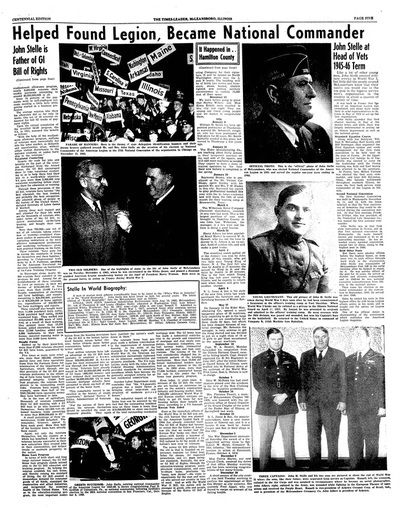
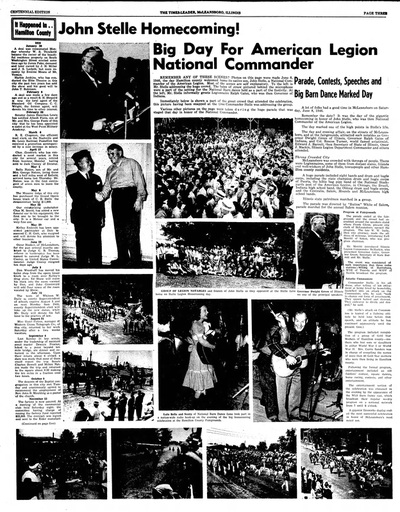
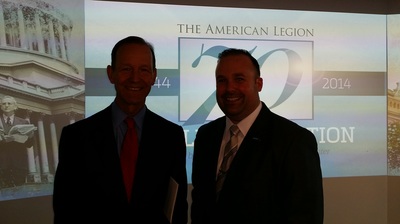
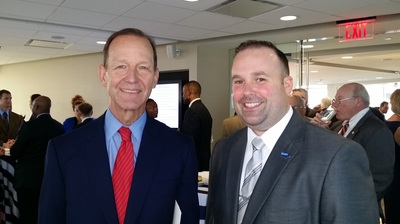
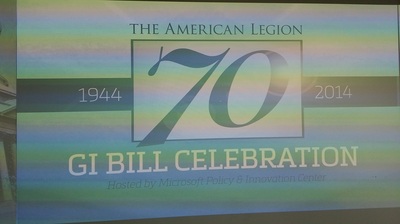
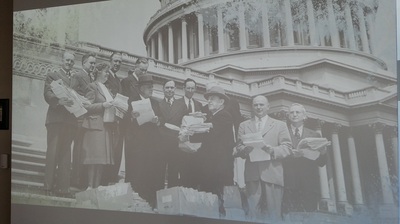
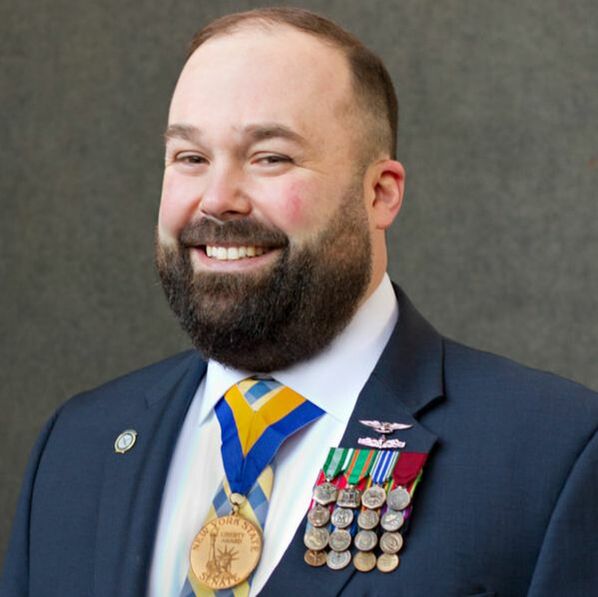

 RSS Feed
RSS Feed
